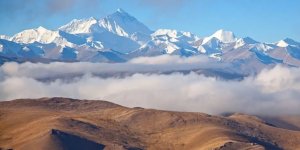World

Obesity is rapidly increasing in Southeast Asia, fuelling rise in related diseases. »

While trees can cool some cities significantly during the day, new research shows that tree canopies can also trap heat and raise temperatures at night. The study aims to help urban planners choose the best combinations of trees and planting locations to combat urban heat stress. »

Mangroves provide important ecosystem services especially to small island states »

World leaders attend grand reopening of Notre Dame Cathedral in Paris five years after damaging fire
On Saturday, December 7, 2024, Notre Dame de Paris reopened in Paris, France after five years of closure following a fire in April 2019 that severely damaged the building's structure. »

Some of the first human beings to arrive in Tasmania, over 41,000 years ago, used fire to shape and manage the landscape, about 2,000 years earlier than previously thought. »

Oil palm plantations are known for environmental harms such as biodiversity loss »

Cities in India and Pakistan rated most polluted in the world. »

Tree planting has been widely touted as a cost-effective way of reducing global warming, due to trees’ ability to store large quantities of carbon from the atmosphere. »

The Tibetan Plateau's glaciers are among the world's most remote and untouched places. »

When did humans colonize the western Mediterranean? New research shows that it may be much earlier than archaeologists thought. »

Multi-disciplinary archaeological survey at the site of Oued Beht, Morocco, reveals a previously unknown 3400–2900 BC farming society, shedding new light on North Africa’s role in Mediterranean prehistory. »

While the ozone layer in the atmosphere protects the earth from the sun’s radiation, at the ground level, ozone is a pollutant that reduces the growth of tropical forests and their ability to absorb carbon, new research shows. »

Climate change is rapidly reshaping a region of the world that’s home to millions of people. »

As continental landmasses rose above sea level to meet wind and rain effects around 3 billion years ago, they underwent a series of geologic processes that helped them stabilize and endure until now, according to a study. »

The McMurdo Dry Valleys are a unique region of Antarctica, nearly devoid of snow and ice. An atmospheric river event in March 2022 led to record warm temperatures over much of Antarctica. »

Researchers recently discovered that Saharan dust is the number one variable linked to tropical cyclone rainfall. »

The National Oceanic and Atmospheric Administration predicts the 2024 Atlantic hurricane season will be more active than normal. This comes after an energetic 2023 season, which brought the fourth-most named storms since 1950. »

Tropical glaciers, which are especially at risk from climate warming, have melted rapidly in recent decades. The question, scientists say, is how much? »

Our increasing demand for metals and minerals is putting over four thousand vertebrate species at risk, with the raw materials needed for clean energy infrastructure often located in global biodiversity hotspots, a study has found. »

Papaya farmers in Kenya are turning to a novel solution to combat the devastating papaya mealybug pest — parasitic wasps. »

Following a flawed update of the Falcon Sensor program of CrowdStrike Holdings, Inc., an American cyber security company based in Austin, Texas, thousands of computers around the world, used by airports, banks, hospitals and other companies were blocked, and the Windows operating system could no longer start. »

Singapore's Food Agency has approved 16 species of edible insects for sale and human consumption in the country, according to a public circular dated July 8, 2024 to food traders. »

Giant lizards called heath goannas could save Australian sheep farmers millions of dollars a year by keeping blowfly numbers down - and must be prioritised in conservation schemes to boost native wildlife, say researchers. »

Wildfire smoke, sometimes drifting across hundreds of miles, reached almost every lake in North America at least one day each year from 2019 to 2021. »

Climate change has affected more than the planet's temperature. As climate change has become more influential, seasonal event timing has fluctuated. »

For the first time, researchers revealed a detailed look at the potential for a major earthquake off the coasts of southern British Columbia, Washington, Oregon and northern California. »

Assumptions that tropical forest canopies protect from the effects of climate change are unfounded, say researchers. »

This year's edition of the Bookfest 2024, International Book Fair, will take place between May 29 and June 2 at the Romexpo exhibition pavilion in Bucharest, Romania. »

An index which measures temperature changes in the Indian Ocean could provide an early warning of dengue outbreaks, to trigger a more effective public health response, researchers say. »

Researchers have found that 2023 was the hottest summer in the Northern Hemisphere in the past two thousand years, almost four degrees warmer than the coldest summer during the same period. »